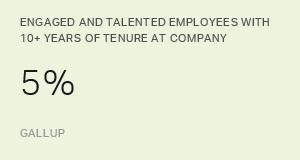Story Highlights
- Managers account for 70% of variance in engagement across business units
- Gallup studied strengths-based practices for 1.2 million employees globally
- Strengths-based companies saw better sales, profit and customer engagement
Only 13% of employees worldwide are engaged at work. What's worse is this low number has barely budged since Gallup began reporting engagement worldwide in 2009, meaning that the vast majority of workplaces have failed to engage their employees.
Why isn't engagement improving? Gallup estimates that managers account for at least 70% of the variance in employee engagement across business units. When Gallup asked U.S. managers why they thought their company hired them for their current role, managers commonly said the organization promoted them because of their success in a previous non-managerial role, or they cited their tenure in their company or field. Unfortunately, these criteria miss a crucial element: the right talent to succeed as a manager.
Gallup estimates that only about one in 10 people naturally possess high talent to manage, and organizations name the wrong person as manager about 80% of the time. And we've learned that one in two employees have left a job to get away from a manager and improve their overall life at some point in their career.
Given the troubling state of employee engagement in companies worldwide, it follows that most managers aren't creating environments in which employees feel engaged -- or involved in, enthusiastic about and committed to their work and workplace.
What's more, companies that fail to engage their employees are missing out on the powerful results that come from engagement. Gallup's latest employee engagement meta-analysis shows that business units in the top quartile are 17% more productive, experience 70% fewer safety incidents, experience 41% less absenteeism, have 10% better customer ratings and are 21% more profitable compared with business units in the bottom quartile.
Badly managed teams breed poorly performing companies, and that weak performance puts added stress on employees, resulting in a negative feedback loop that is dangerous to any business' long-term health. Fortunately, Gallup has identified a straightforward way businesses can reverse this negative trend: managing employees by focusing on their strengths.
Focusing on Strengths-Based Development
Gallup has studied thousands of work teams and millions of leaders, managers and employees and discovered the significant potential in developing what is innately "right" with people versus trying to fix what's "wrong" with them. A focus on employee strengths proceeds from the simple notion that we are all better at some things than others and that we would be happier and more productive if we spent more of our time doing those things.
Gallup researchers recently completed an extensive study of companies that have implemented strengths-based management practices. Though many research studies have shown that strengths-based employee development leads to more engaging and productive workplaces, we believe this study is by far the largest and most comprehensive to date.
Gallup studied workgroups that were using strengths-based interventions to examine the effects those interventions had on workgroup performance. This study included 49,495 business units with 1.2 million employees across 22 organizations in seven industries and 45 countries. Gallup researchers examined six outcomes: sales, profit, customer engagement, turnover, employee engagement and safety. On average, workgroups that received a strengths intervention improved on all of these measures by a significant amount compared with control groups that received less-intensive interventions or none at all. Ninety percent of the workgroups studied had performance increases at or above the following ranges:
- 10% to 19% increased sales
- 14% to 29% increased profit
- 3% to 7% higher customer engagement
- 6% to 16% lower turnover (low-turnover organizations)
- 26% to 72% lower turnover (high-turnover organizations)
- 9% to 15% increase in engaged employees
- 22% to 59% fewer safety incidents
Almost seven in 10 employees (67%) who strongly agree that their manager focuses on their strengths or positive characteristics are engaged. When employees strongly disagree with this statement, the percentage of workers who are engaged in their work plummets to 2%.

For organizations seeking to improve performance on crucial business outcomes, strengths-based development is a proven solution. To boost their business, leaders need to start developing people based on what is right with them.


